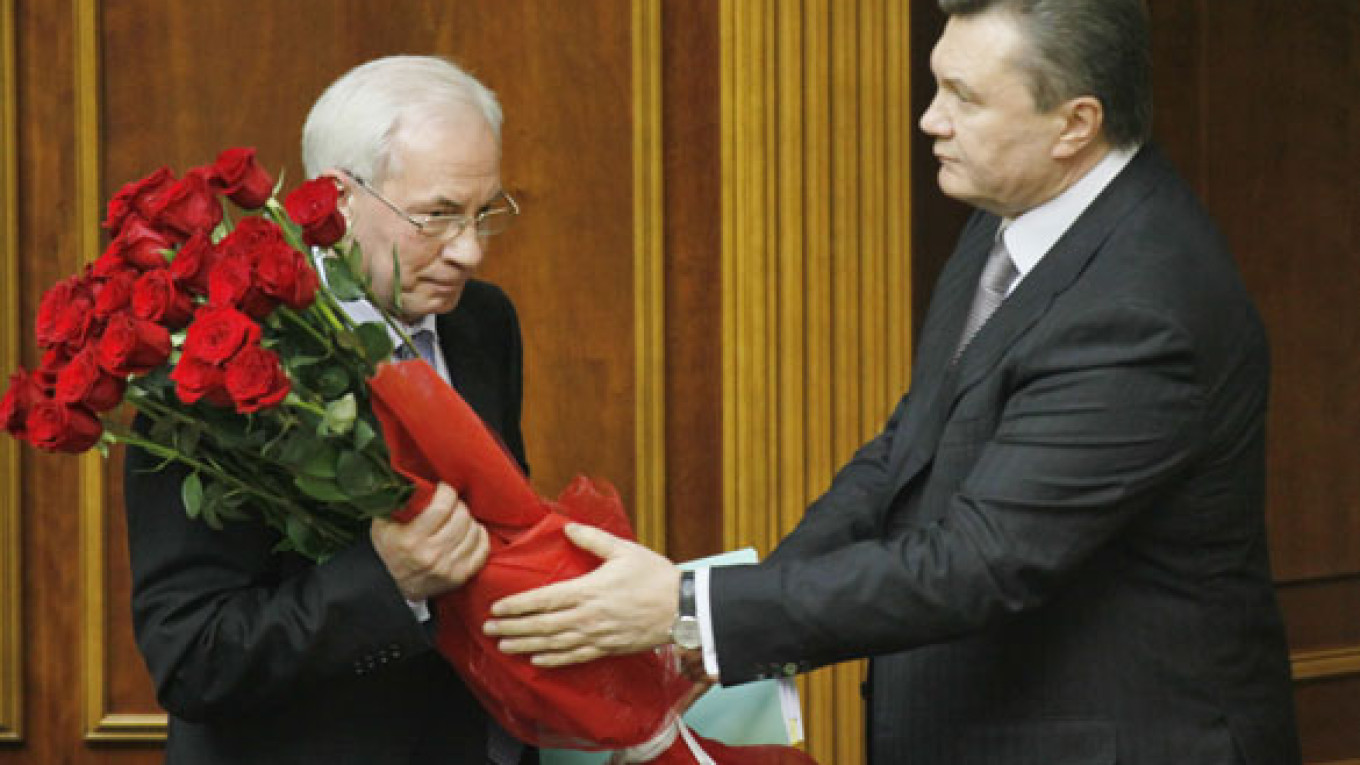KIEV — Declaring that state coffers are empty, new Ukrainian Prime Minister Mykola Azarov promised on Thursday to meet all obligations to the International Monetary Fund and to push through a realistic 2010 budget.
President Viktor Yanukovych has moved swiftly to consolidate power since his election last month to end years of dysfunctional government and economic backsliding under the leaders of the 2004 Orange Revolution.
“The country has been plundered, the coffers are empty, state debt has risen threefold,” Azarov, a former finance minister and a close Yanukovych ally, told the parliament shortly before deputies confirmed his appointment.
Battered by the economic downturn, Ukraine needs to adopt a 2010 budget and restart talks with the International Monetary Fund on a suspended bailout package worth $16.4 billion.
Azarov said he would invite the IMF “as soon as possible” and pledged to redraft and get approval for a realistic version of the much-delayed 2010 budget.
The IMF will watch closely how Ukraine handles the budget after a series of broken spending promises — backed by Yanukovych’s Party of the Regions — derailed the bailout package.
Azarov said he hoped that the IMF would resume lending, but added, “We hope that this program will be broadened and will be reviewed taking into consideration realities in our country.”
Azarov said Ukraine had to repay 44 billion hryvnas ($5.5 billion) in domestic debt by the end of the year, a challenge he described as very serious.
Azarov is seen as a safe pair of hands but no radical reformer. He gives Yanukovych a reliable ruling partner after the infighting that split the alliance that emerged from the Orange Revolution.
Yanukovych needed a new ruling coalition to avoid calling a snap parliamentary election.
But a coalition between the Party of the Regions, the Communists and the Litvyn bloc announced on Thursday relies on the support of several nonfaction deputies for its 235-seat majority, and it remains to be seen how stable this will be.
Azarov, who was born in the Russian city of Kaluga, replaces Yanukovych’s rival, Yulia Tymoshenko, who was ousted as prime minister in a vote of no confidence last week.
A powerful orator, Tymoshenko could yet prove a thorn in the government’s side from opposition having refused to recognize Yanukovych’s election.
Tymoshenko said the new government was “made up completely of Ukrainian oligarchs.”
“I predict the first thing they will do is to divide among themselves the financial spoils … and the strategic state assets for shady privatization,” she told a news conference.
The parliament on Thursday endorsed Yanukovych’s nomination of Ukraine’s ambassador to Moscow, Kostyantyn Khryshchenko, as the new foreign minister and former Navy commander Mykhailo Yezhel as defense minister.
The lawmakers also appointed longtime Azarov associate Fedir Yaroshenko as finance minister and Socialist Party deputy and former Interior Minister Vasyl Tsushko as economics minister.
Former central bank chief Sergei Tigipko, who came a strong third in the first round presidential election on a reformist platform, is one of six deputy prime ministers.
A Message from The Moscow Times:
Dear readers,
We are facing unprecedented challenges. Russia's Prosecutor General's Office has designated The Moscow Times as an "undesirable" organization, criminalizing our work and putting our staff at risk of prosecution. This follows our earlier unjust labeling as a "foreign agent."
These actions are direct attempts to silence independent journalism in Russia. The authorities claim our work "discredits the decisions of the Russian leadership." We see things differently: we strive to provide accurate, unbiased reporting on Russia.
We, the journalists of The Moscow Times, refuse to be silenced. But to continue our work, we need your help.
Your support, no matter how small, makes a world of difference. If you can, please support us monthly starting from just $2. It's quick to set up, and every contribution makes a significant impact.
By supporting The Moscow Times, you're defending open, independent journalism in the face of repression. Thank you for standing with us.
Remind me later.


